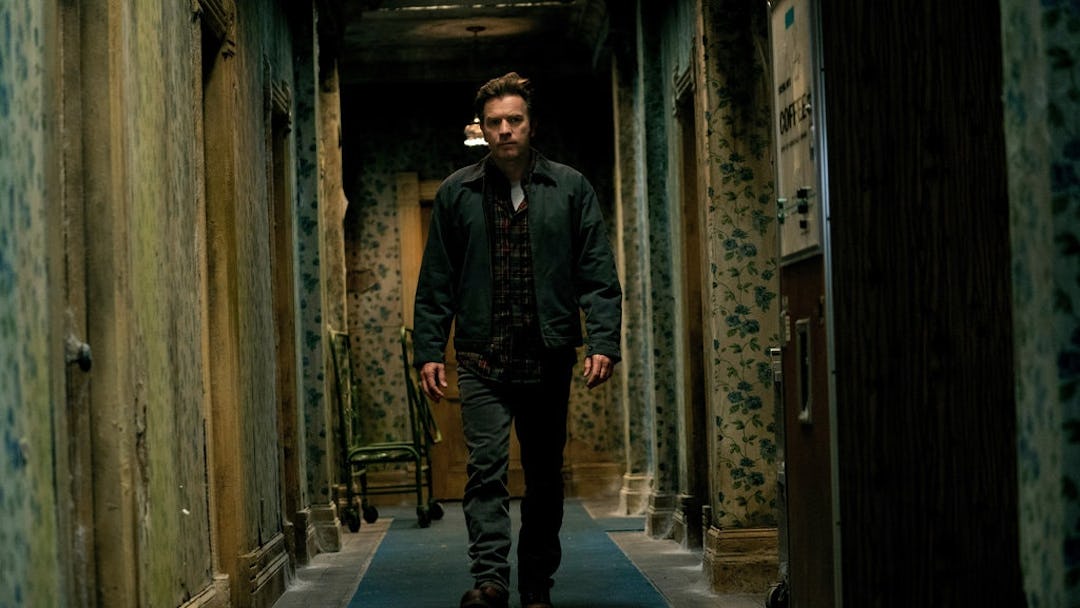In retrospect, my first mistake was probably re-watching Stanley Kubrick’s The Shining the night before my press screening of Doctor Sleep, Mike Flanagan’s new film adaptation of Stephen King’s follow-up novel. I was explicitly encouraged to by the film’s ad campaign – the tagline is “Dare to go back” – but doing so did little but underscore the fundamental impossibility of Flanagan’s task. Mr. King famously loathed Kubrick’s interpretation of his story, complaining about it to anyone who’d listen, penning a more faithful do-over for television in 1997, then attempting to take back his own narrative when Doctor Sleep was published in 2013.
The problem, of course, is that a great many people other than Stephen King like Stanley Kubrick’s The Shining very much – including, apparently, Mr. Flanagan. And thus he attempts to make both a faithful adaptation of King’s new book and a direct descendant of Kubrick’s film, full of musical lifts, visual quotations, and even reenactments of key moments from the original. But the two works are fundamentally incompatible, and in trying to accomplish both feats, Doctor Sleep does neither one successfully.
In fact, the end result feels like one of those behind-the-scenes stories you occasionally hear about existing scripts that are hastily rewritten into sequels of hot properties (like how the unrelated Simon Says became Die Hard With a Vengeance). The bulk of Doctor Sleep concerns a cult of telepaths, led by “Rose the Hat” (Rebecca Ferguson), who move like travelers, settling into camps and living out of RVs, maintaining their youth by drinking in the “steam” of the young telepaths they murder. They keep the “steam” in canisters, and pop one open whenever one of them is getting a little too mortal.
Let’s just come out and say it: though there are some genuinely disturbing sequences in this thread, the "steam thieves" stuff is pretty goofy. It feels, at risk of putting too fine a point on it, like late King, miles removed from the domestic drama, bottled madness, and middle-of-nowhere claustrophobia that made The Shining – both the novel and the movie – so effective. And while it’s always tricky to guess at the tastes of the dearly departed, it seems safe to bet that Kubrick would’ve loathed all of this immortal-supernatural-monster mess, particularly when it veers into Walking Dead territory in the third act (including, swear to God, a shoot-out).
So how does all this tie into The Shining? Well, you see, we’re also following little Danny Torrance; after an ill-conceived early section, set in the immediate aftermath of The Shining, we meet up with adult “Dan” (played, reasonably well, by Ewan McGregor), who has turned into an alcoholic, dirtbag drifter. He eventually settles down, finds a job, gets clean, and goes to meetings. A few years later, he develops a psychic connection with Abra Stone (Kyliegh Curran, very good), whose “shine” is strong enough to attract the attention of Rose and her crew.
All of this leads, by what could politely be described as strained plotting, to a climax at the old Overlook. Throughout the picture, Flanagan freely quotes from Kubrick, from shot composition to props to even a job interview scene staged exactly like the job interview from The Shining, down to the tiny flag and nameplate on the desk. It’s impressive, I guess, but why is it there? (The best I can guess is so we can all nudge each other and whisper, “That’s just like in the original.”) But all of those little flourishes are a mere warm-up for the climax, in which characters wander through the Overlook for no clearer purpose than to allow Flanagan to quote-tweet iconic moments, and we can all nod in recognition and remember, yep, that sure was something in the original. There’s sadly little daylight between this sequence and the Shining stretch of the loathsome Ready Player One; the only difference is that at least RPO acknowledges that it's cosplay.
The two scenes in genuine conversation with the original movie – one at an AA meeting, one at the Overlook – make it crushingly clear how inherently irreconcilable these narratives are. We’ve suddenly shifted into a completely different movie, and watching Flanagan attempt to pivot between them is like sitting on the sofa, trying to watch TV while your partner is channel surfing.
"Doctor Sleep" is out tomorrow.
